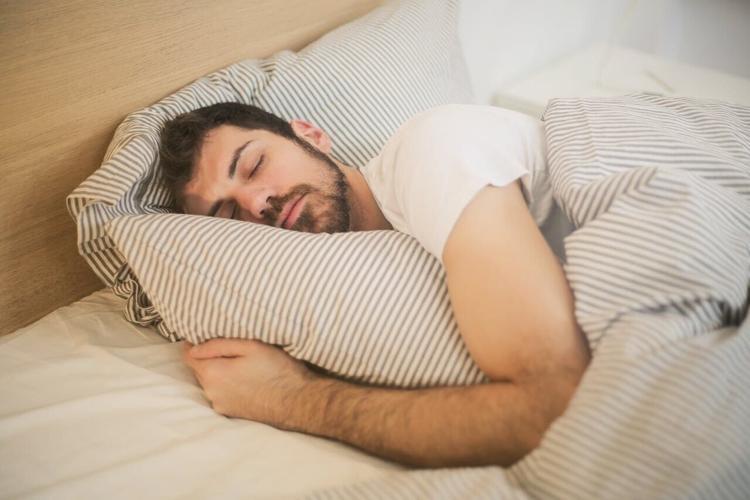
Photo by Andrea Piacquadio via Pexels
By Stephen Beech
Going to bed at the same time every night could lower blood pressure, according to new research.
Regularizing bedtime - without changing sleep duration - may help control high blood pressure, scientists say.
The common long-term medical condition, also known as hypertension, often has no symptoms, but can increase the risk of potentially deadly health issues such as a heart attack or stroke.
Now, a new American study, published in the journal Sleep Advances, suggests that a regular bedtime could have a beneficial effect on blood pressure for people with hypertension.
Dr. Saurabh Thosar, of the Oregon Institute of Occupational Health Sciences, says one of the easiest health interventions imaginable - going to bed at the same time, or close to the same time, every night - could meaningfully reduce blood pressure in people with hypertension.
Dr. Thosar and Professor Leandro Campos de Brito found that people with hypertension who stuck to a consistent bedtime for two weeks experienced "significant" drops in their blood pressure, particularly during nighttime hours.

Photo by cottonbro studio via Pexels
The intervention worked even for participants already taking medications to treat hypertension.
The researchers recruited 11 middle-aged adults with hypertension to conduct the study. After monitoring participants' normal sleep patterns for a week, the research team asked them to choose a bedtime and stick to it for two weeks, avoiding daytime naps. Participants weren't told to sleep more or less—just more regularly.
Dr. Thosar said: "The results were striking.
"Participants' bedtimes, which initially varied from night to night by on average 30 minutes, dropped to just seven minutes of variability.
"That consistency translated into cardiovascular benefits: 24-hour blood pressure dropped by 4 mmHg systolic and 3 mmHg diastolic - reductions comparable to regular exercise or salt reduction.
Nighttime blood pressure saw even larger decreases of 5 mmHg systolic and 4 mmHg diastolic.
Those numbers may sound modest, but a 5 mmHg reduction in nighttime blood pressure can lower cardiovascular event risk by more than 10%.
"Half the participants decreased their blood pressure beyond the point indicating positive physiological change."
Previous major studies have linked irregular sleep patterns to cardiovascular risk.

Photo by Ketut Subiyanto via Pexels
One study found that a 30-minute increase in day-to-day sleep onset time raises hypertension risk by more than 30%.
The research team suspects irregular bedtimes disrupt the body's circadian timing system, which regulates both sleep-wake cycles and cardiovascular function.
Blood pressure normally dips during nighttime sleep, and people whose blood pressure doesn't dip adequately face higher cardiovascular risks.
But the study suggests that regularizing bedtime may strengthen circadian rhythms and restore healthier blood pressure patterns.
The researchers say it was a small, proof-of-concept study without a control group, although they used 24-hour ambulatory blood pressure monitoring - the "gold standard" because it captures night-time patterns that clinic measurements miss.
Dr. Thosar said: "The results need confirmation in larger randomized controlled trials.
Still, the findings are encouraging.
"Bedtime regularization represents a low-cost, low-risk intervention that could complement existing hypertension treatments."
He added: "Unlike medications with side effects or difficult lifestyle changes, going to bed at the same time requires minimal effort."
The research adds to growing recognition that sleep consistency matters as much as duration.























(0) comments
Welcome to the discussion.
Log In
Keep it Clean. Please avoid obscene, vulgar, lewd, racist or sexually-oriented language.
PLEASE TURN OFF YOUR CAPS LOCK.
Don't Threaten. Threats of harming another person will not be tolerated.
Be Truthful. Don't knowingly lie about anyone or anything.
Be Nice. No racism, sexism or any sort of -ism that is degrading to another person.
Be Proactive. Use the 'Report' link on each comment to let us know of abusive posts.
Share with Us. We'd love to hear eyewitness accounts, the history behind an article.